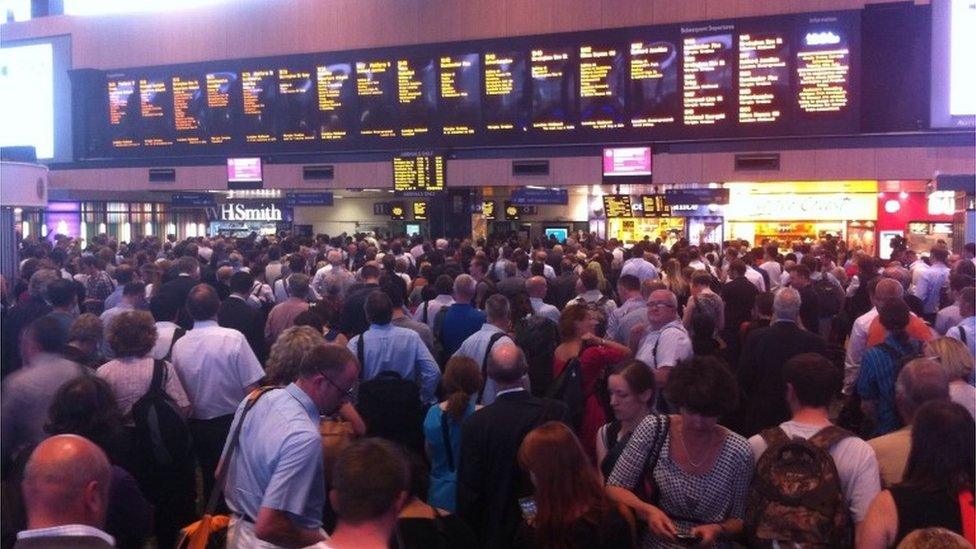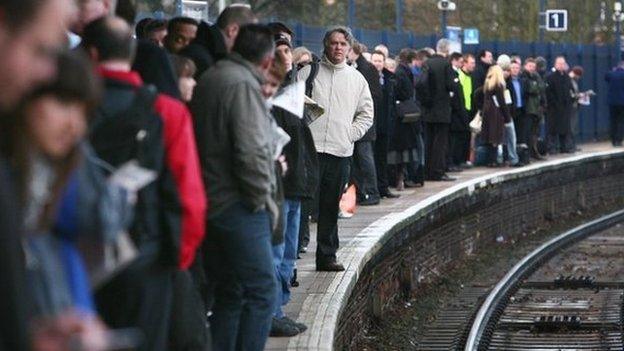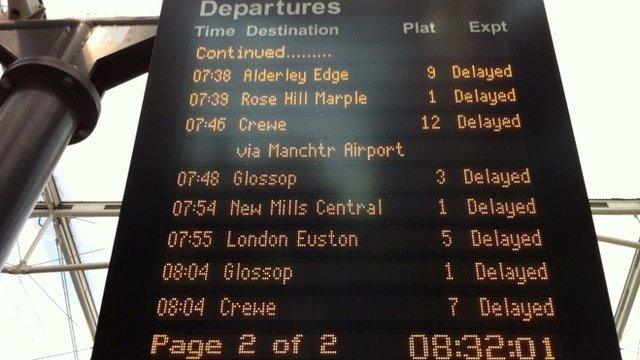Figures reveal 'significant' daily train delays
- Published

About 57 trains are significantly late every day on the British railway network, according to industry figures.
More than 5,000 trains were delayed by 30 minutes to two hours between July and September, the Office of Rail and Road (ORR) data showed.
Govia Thameslink Railway had on average nine severely delayed trains per day while Great Western Railway had seven.
Operators said a busier network meant incidents had a greater knock-on effect on other services.
But the Campaign for Better Transport said the companies should make more effort to ensure passengers received compensation for significantly delayed trains.
According to analysis by the Press Association, the Caledonian Sleeper - which runs overnight trains between London and Scotland - was the operator with the highest percentage of its services suffering severe disruption with 3.7% or one in 27 trains.
Passengers using Govia Thameslink Railway (GTR) - which is responsible for Thameslink, Southern and Gatwick Express services - suffered from the largest year-on-year rise in the number of significantly late trains up 73% to 816 over the three-month period.

Services with the most number of severe delays (in percentage and average number per day)
Caledonian Sleeper - 3.7% = 0.2 trains per day
First Hull Trains - 2.7% = 0.3 per day
Virgin Trains East Coast - 2.6% = four per day
Grand Central - 2% = 0.4 per day
Virgin Trains West Coast - 1.9% = five per day
CrossCountry - 1.0% = three per day
First TransPennine Express - 0.7% = two per day
East Midlands Trains - 0.53% = two per day
Great Western Railway - 0.47% = seven per day
South Western Trains - 0.3% = five per day
Govia Thameslink Railway - 0.27% = nine per day
*The figures do not include trains that were at least two hours late.

James MacColl of the Campaign for Better Transport said: "Late-running trains can be very frustrating, but far too few passengers understand when they're due compensation or how they should go about claiming it."
Since July, passengers have also been able to claim compensation in cash, rather than receiving vouchers against future travel.
But campaign groups wants customers to be told - for example, by a public announcement on the train - that they are entitled to get some money back and compensation forms to be handed out.
Just over half the country's train operators offer compensation after a 30-minute delay, under what is known as the Delay Repay scheme.
A spokesman for the Rail Delivery Group, which represents train operators and Network Rail, described timetables as a "promise to passengers" and insisted "we never want people to suffer delays or disruption".
He added: "Train operators and Network Rail are working hard together every day to deliver a better, more punctual railway and to give people better information when things do go wrong."
A GWR spokesman said: "We run more than 1,500 trains across our network every day - while others on the list run less than a dozen.
"As a proportion of the trains we run, these figures show there are fewer significant delays on the Great Western network than the vast majority of other train operators featured in the list."
- Published19 July 2015

- Published19 July 2015
